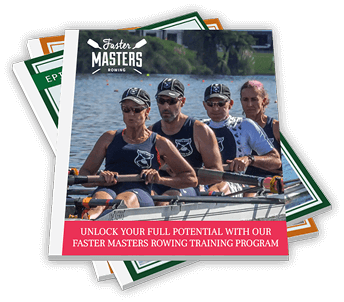Dealing with foot cramps, forearm cramps & whiplash in the rowing boat.
Timestamps
01:00 This Past Week - what we do to advocate for masters rowing
Running a sculling camp. Collecting post-regatta feedback - 10 things you did really well and 10 things you'd like to improve.
Dealing with different cramps in the boat
09:45 Cramps in the boat. First look at nutritional causes - your electrolyte balance of calcium, magnesium, potassium levels. Check your hydration as well. Check your muscles - are you gripping too hard?
12:15 Muscle goes into contraction in a cramp and does not want to unlock or release. Calcium aides this muscle release. Neurological release by contracting the opposite muscle. Reciprocal inhibition if you contract one muscle the antagonist muscle must relax. Foot cramps - lift up your toes to contract the top of your foot muscles to relieve in the arch of your foot.
Cures for cramps
15:10 Calf muscle cramps
Extend your leg and pull the toes towards you. Also use elastic bands. A Charley Horse is a common US name for a muscle cramp.
17:30 Hamstring cramps
Contract your quadricep hard to release. Extend your knee and straighten your leg. Lie on the floor and lift your leg up straight off the floor.
20:00 Forearm cramps - often caused by tension in the hand.
Frequently happens when you switch from sweep to scull or swap sides in sweep. Avoid cramps by getting into the rowing stroke rhythm and release your hands within the stroke. Let the handle move with your fingers. Keep the circulation going.
If you do get a forearm cramp, raise your arm and pump your fist open and closed. Must be above the height of your heart.
Marlene-ism "Let the oarlock be an oarlock". 25:30 Abductor muscle cramp This is probably caused by the glute medius. Squeeze a water bottle between your knees to release.
27:30 Whiplash - if you get this in the boat when looking around quickly it's hard to release.
Warm up the muscle, stretch it and massage it with your fist or fingers. Cold muscles are more susceptible to cramps.
30:00 Thixotropic ligaments and tendons. Getting cramp towards the end of an outing happens. Take a little cooked potato with salt, or electrolytes or a banana to prevent this.
Coaching athletes of different ability
33:00 Question: How to work with a squad of different skill levels. Develop your sculling ability - have a pathway to progress. What am I signing up for? Set outings for integration with more experienced people. Switch seats in crew boats.
38:30 Pontoons from Revolution Rowing give stability for singles and doubles, as do Wraptor Balance pontoons.

